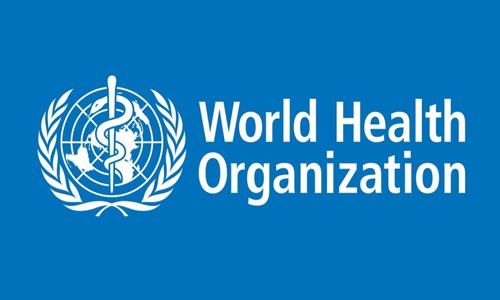HOME >> CHINA
WHO’s remarks on China's COVID-19 response objective, unbiased: China's chief epidemiologist
By Zhang Hui Source:Global Times Published: 2020/4/3 17:32:02
As infections grow, West refuses to reflect on its own inaction but blames China, WHO

Photo: the WHO emblem
Defending WHO against absurd accusations that the organization has been "working with China to conceal the death toll in the country," China's chief epidemiologist said on Friday that WHO has been objective and should not be subject to political slander.
Since January, the WHO has been issuing advice on the coronavirus but the warnings fell on deaf ears. Now as infections continue to climb in the US and Europe, some media, including US news outlet Foreign Policy, are anxious to pin the blame on others, accusing the WHO of speaking for China and helping China "lie about the epidemic."
Zeng Guang, chief epidemiologist with the Chinese Center for Disease Control and Prevention,told the Global Times on Friday that WHO's objective judgement concerning China's response was based on the consensus from its international team of experts, which was largely composed of members from Europe and the US.
"Should the WHO speak for countries who played the role of a jeering audience for two months doing nothing except attack and smear China's efforts? Even if the WHO did say something positive about the US' response, who would buy it?" Zeng said.
China has indeed done a good job by global standards. Identifying an infectious disease at the end of December was an extremely difficult task as that is flu season, Zeng said.
On December 27, 2019, Zhang Jixian, director of the department of respiratory and critical care medicine at a Hubei-based hospital, first reported three suspicious cases she had treated. Just days later, on January 3, China formally began to take the initiative to report the disease situation to the WHO and other countries, including the US.
"From discovering an infectious disease to reporting it to the WHO, no other country can compare with China when it comes to such a rapid response," Zeng said, noting that China will still endeavor to reflect and review on the experience to further improve future responses.
China isn't the only country that the WHO has praised. Countries such as South Korea have won praise for making progress in combating COVID-19, as has Italy for its "genuine sacrifices" in slowing the virus.
Some media outlets have claimed that the WHO was reluctant to declare a Public Health Emergency of International Concern in January and that it waited until March 11, when numbers in China were dropping, to declare COVID-19 a pandemic, even though the disease had spread globally weeks before.
However, the WHO has been issuing guidance and advice to all countries since January and has been updating the daily global outbreak numbers since January 21.
"It's strange that countries like South Korea, which responded quickly following WHO guidance, have not complained [about the WHO], but those with slow and delayed responses are full of complaints," Zeng said.
Western countries like the US are failing to admit their own mistakes in handling the COVID-19 outbreak and lost the two months that China earned for the world. They are not only holding China to double standards but also turning black into white by smearing China and the WHO.
As for claims that the WHO is covering for China as it depends on funding from the country, Zeng said that China supports global health affairs by supporting the WHO, and WHO's funds are used to serve the entire world.
"We welcome the US to contribute more to the WHO, instead of refusing to pay UN membership fees," Zeng said.
Bruce Aylward, assistant director general of the WHO and leader of the WHO team that visited China in February, denied that China has hidden data in an interview with Vox in March.
Aylward said the team looked at many different things to try to corroborate that the number of cases was dropping. He talked to fever clinics and physicians in hospitals who said that the number of patients were dropping and they had open beds. People running clinical trials for drugs even noted that they were having problems recruiting patients.
Posted in: SOCIETY